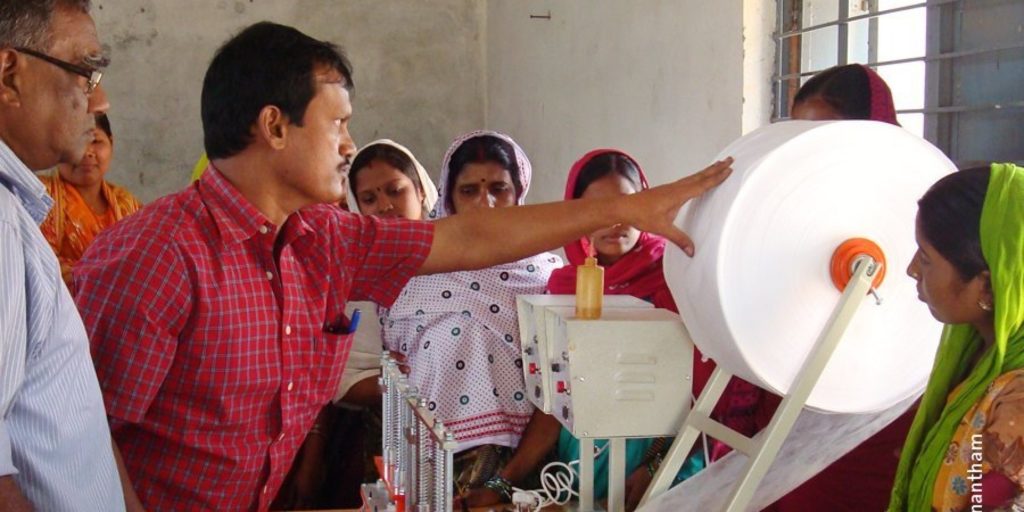5 Minutes Read
Due to the unavailability of pads in the nearby shops and any other alternatives in this lockdown situation, the women in the rural and semi-urban areas will switch over to unhygienic methods of using rag, old cloth etc.
Arunachalam Muruganantham
The COVID-19 pandemic in the state has lessened the availability of almost all the essential commodities. The government has implemented a month long lock down considering the safety and health of the people. Health, hygiene and social distancing is the only vaccine against the novel corona virus. But the lock down has strangled the supply of many essential commodities to the people. In the case of women in our country, being hygienic in their menstrual cycle amidst this pandemic situation, is a Herculean task. Meanwhile in rural areas, the availability of sanitary napkins in the nearby outlets and shops are very limited. It is due to the shutdown of factories and other industries that used to produce sanitary napkins; Napkins which were manufactured before the closure are circulating in the market right now.
To mitigate the suffering of menstruating women, social entrepreneur Arunachalam Muruganantham, better known as Padman of India, urges the authorities to permit all sanitary napkin manufacturers as well as Women Self Help Groups in the country to resume their functioning. He shared his concerns and suggestions with The Station.
Padman @ The Station
Mr. Muruganantham, the young mind from Coimbatore, whose invention of low-cost sanitary pad making machine brought out a revolution in rural India which encouraged women to shun the unhygienic practices and dogmas persisted in relation to menstruation. For the past two decades he has been creating awareness among uneducated women as well as young girls to follow proper menstrual hygiene and to annihilate the taboos about menstruation.
“I am bombarded with frequent phone calls regarding the scarcity of napkins in the state under lockdown.”
“Both the central and state government have taken immense steps in creating awareness and making women use pads to follow proper hygiene. Even the GST for sanitary pads was slashed by the government. But these collective efforts will be good for nothing until the government takes steps to understand the concerns of women’s hygiene and makes sanitary pads an essential commodity”.
“Because of our collective effort, the taboo on menstruation and sanitary napkins have dwindled. During national disasters, people used to collect and donate food and clothes only. But now the situation has changed. They are asking and donating sanitary pads also. This is a humongous development. We have witnessed this during disasters like the Gaja cyclone, Kerala flood. It is not only about eradicating a prevalent taboo from society, but the value of life, dignity and scientific temper that the people gained”
“Due to the unavailability of pads in the nearby shops and any other alternatives in this lock down situation, the women in the rural and semi-urban areas will switch over to unhygienic methods of using rag, old cloth etc., during their menstrual cycle. If they do not get pads for two cycles, they will revert back to unhygienic practices. It will considerably affect their health. The government should pay attention to this issue.”

The sanitary napkin has been enlisted as an essential commodity and allowed hussle free transportation and distribution by the Central Government of India. But there is a confusion across the state whether the manufacturing and production of sanitary pads are allowed or not. There are a lot of women groups who are into small scale production of sanitary pads. Although the government has included hygienic products like body wash, diapers and sanitary napkins in the list of essential items during this pandemic lockdown, the lack of proper communication is stifling its production and availability
“The authorities have only thought about the distribution. If the situation continues for a few more days, the state has to consider the production part also. In the case of sanitary napkins, functioning of large scale industries is a conundrum in the current situation. But there are many rural based small scale industries in India producing sanitary napkins. They can produce and distribute from there and distribute locally. So, we need official government approval for the execution of this model by including self help groups in the area”
“It is not plausible for me as a single man to get permission from the local authority to start manufacturing. I need a chain of workers including technicians and high tech machinery to run this essential service. There is only a need of 5 to 6 workers per production unit. So there won’t be an issue to adhere to the physical distancing norms and other safety measures of the government. They can even distribute through scooters locally in rural areas, similar to other regular commodities. Now we need to revive the production at war footing”.
“Around 25000 low-cost sanitary pad making machines installed in our country are running out of raw material for the manufacturing and I receive hundreds of calls from myriad production units from all over the state informing of the impasse.”
“I am not aware about the free distribution of sanitary napkins by Whisper in tandem with the Brihanmumbai Municipal Corporation (BMC). If they are donating 6,00,000 pads to women in need during the lock down, it is a great news. But the facts need to be checked properly before disseminating such information”.

The padman of India, Arunachalam Muruganantham requests women to maintain proper menstrual hygiene during this period, which is more important than before because of lock down and people crammed inside the house round the clock.
“Make an extra effort to get access to sanitary pads and maintain proper menstrual hygiene. This period is more crucial.”
Good one.
Gud work
Nice work. Way to go
nice man